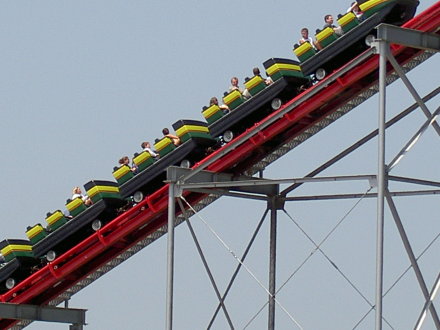|
Today's Featured Biography
Wesley (Bill) Stillwagon
On the personal side,
Wes is an amateur Theatre Organist (Mighty Wurlitzer). While Wes plays some more modern ballads, his favorite music is that of Irving Berlin. He also likes the music of Sigmund Romberg, Jimmy McCue, Cole Porter, etc. He is a member of the American Theatre Organ Society, and The Atlantic City Convention Hall Organ Society. He has recently purchased a Rodgers Trio (three manual, full pedal board). Wes is a licensed Amateur Radio Operator, and an accordianist who plays where ever this is legal and not covered under the nuisance laws (he collects accordian jokes).
Wes is also interested in his family Geneology. The Stillwagon family has a wonderful rich history in the US dating to the time of the Revolution. His line has been in New Jersey since that time (Please note, the information provided here should not be construed as an offering for breeding purposes).
He has a deep interest in the life and works of John Steinbeck, American Nobel Prize Winning writer of many literature classics. He is a member of the John Steinbeck Foundation. And a visitor to John Steinbeck's Monterey, California (Cannery Row) area (you can visit there yourself using the web by clicking on the link). He is also interested in the life and work of Steinbeck's friend and mentor, Marine Biologist Edward Flanders Ricketts. Both Steinbeck, Ricketts, and others engaged in deep discussions with Joseph Campbell on Cannery Row. Wes was recently honored by being invited to be a member of the Third Lab Team. Readers of Steinbeck's Cannery Row and Sweet Thursday will have some idea about the significance of the Lab Teams.
Wes's Performance Engineering philosophy is Jungian in leaning. He owns and has read (while not always completely understanding), Jung's collected works. Much of his performance engineering processes and concepts are a result of that independent study. For more information please see http://www.cgjungpage.org/.
Visit "C. G. Jung, Analytical Psychology, and Culture"
He is interested in World War II history, especially that of the US Navy, Pacific Theatre. He is a member of the Naval Institute, the Navy League, the USS Hornet Club, and is a plank owner of The USS Hornet Museum, The Battleship New Jersey Organization, is a charter member of the Naval Historical Center and similar organizations. He believes the focused study of the US Navy, World War II, with the rich writings of events, heros, and others, provides a wonderful resource for the study of human performance. His paper, "Some Reflections From a Human Performance Engineering Perspective on Heros and Characters From the U.S. Navy During the Second World War" provides some opportunity to support and demonstrate his performance engineering concepts. You may read and comment on it by clicking on the title (linked).
Wes retired from training and performance improvement in business and industry, his profession since 1968 and within which he has produced many award winning, profit making training programs. He developed the HallowQuestTM process over several years in the 1980's. The process and the results have been objectively evaluated by the best in the field who declared that nothing better exists. The author of many internationally published works on training and performance improvement (see list), he advises many professionals on individual performance problems and suggests reasonable, cost-effective solutions.
He is a fully qualified Motion Picture Projectionist and occasionally performs the functions as a volunteer for some theatres.
His publications include:
"Managing Cost Accounting for Training" in the ASTD, Training and Development Handbook, fourth edition, publ. McGraw-Hill; "
"Technical systems performance engineering and human performance engineering" in Human Resource Development Institute, Enhancing performance, learning, and integrity, Volume 1 Number 2, July, 1998, publisher Routledge, ISBN: 1367-8868. Sponsored by the Academy of Human Resource Development and the Institute of Personnel and Development. Available at the link, above.
John Steinbeck, Jungian Thought, the Phalanx and the Development of High-level Management Teams," (see: http://www.cgjungpage.org/articles/phalanx.html);
Illusion and The Design of a Successful Simulation Program (see:http://www.cgjungpage.com/articles/illusion.html);
"New Approach Speeds Simulator Design and Procurement," Power Engineering magazine, April, 1987;
"Improving Manufacturing Competitiveness through the Application of Human Performance Engineering," (with Roland Burns, Ph.D. University of Plymouth, UK), International Journal of Technology Management, pub. Inderscience;
Enterprises Ltd. and The United Nations Educational, Scientific, and Cultural Organization (UNESCO); "Improving Manufacturing Performance through Human Performance Engineering," Operations Management Association (UK), (with Roland Burns, Ph.D. University of Plymouth, UK) Publisher: Springer-Verlag.
Some Reflections From a Human Performance Engineering Perspective on Heroes and Characters From the U.S. Navy During the Second World War (part of these pages)
Technology Training and Performance Engineering (part of these pages)org
VIEW ALL BIOGRAPHIES
|


 Indicates an included photo
Indicates an included photo
